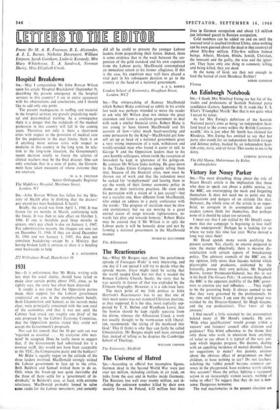1931 S111,—It is unfortunate that Mr Blake, writing with less
than his usual clarity, should have failed to make clear certain points about 1931, since, as he rightly says, the story has often been distorted.
It simply is not true that the Opposition parties made their support for the Labour government conditional on cuts in the unemployment benefit. Both Chamberlain and Samuel, as the records make clear, were principally concerned with the sum total of the economies and that it was not until the Cabinet 'had struck out roughly one third' of the cuts proposed by the Cabinet Economy Committee, that the Opposition parties stated they could not accept the Government's proposals.
Nor can his remark that the 10 per cent cut was 'regarded as essential . . . by everyone who mat- tered' be accepted. Does he really mean to suggest that, if the Government had substituted for it a revenue tariff, this would not have been acceptable to the TUC, the Conservative party and the bankers?
Mr Blake is equally vague on the attitude of the three leaders involved. MacDonald strongly wished the Labour government to face up to the crisis. Both Baldwin and Samuel wished them to do so. Only when the break-up was quite inevitable did the three of them settle for a 'government of in- dividuals,' in Baldwin's case, at least, with‘extreme reluctance. MacDonald probably hoped to salve some credit for the Labour movement, and certainly
did all he could to prevent the younger Labour leaders from jeopardising their future. Indeed, there is some evidence that in the week between the sus- pension of the gold standard and his own expulsion from the Labour party, MacDonald contemplated an immediate return to his former allegiance. If this is the case, his expulsion may well have played a vital part in his subsequent decision to go to the country at the head of a national government.
A. .1. L. BARNES London School of Economics, Houghton Street, London, WC2


































 Previous page
Previous page